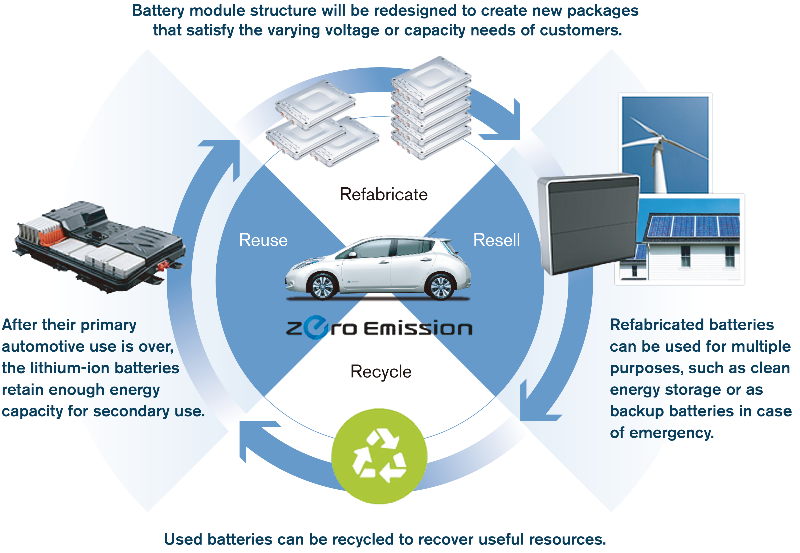Nissan, Middle Tennessee Electric, UT-Oak Ridge Innovation Institute, Tennessee State University and Seven States Power Corp. Announce Innovative Battery Storage Project

FRANKLIN, TENN. - Nissan, Middle Tennessee Electric, the University of Tennessee-Oak Ridge Innovation Institute, Tennessee State University and Seven States Power Corporation are teaming up to launch an innovative second-life battery storage project.
The rapid transition to electric vehicles and the escalating need for energy storage is driving demand for innovative approaches to repurposing used electric vehicle (EV) batteries to enhance the resilience of America’s electric grid. This partnership seeks to build a solution that can be helpful locally and modeled globally.
Used battery packs from Nissan’s all-electric LEAF – the first mass-produced EV in the U.S. - will be used to construct two Battery Energy Storage Systems (BESS) at Nissan America’s headquarters in Franklin, Tenn. The retrieved packs will undergo testing and be assembled in modular, scalable storage systems. The BESS systems will provide supplemental power supply and peak demand shaving* for Nissan’s facilities and support the Middle Tennessee electric grid.
This project will repurpose Nissan’s used EV batteries, giving them a “second life” as a BESS for the Nissan electrical system. The group will also research how to best reduce energy usage, improve battery life, optimize energy distribution within the system and into the grid, house and scale the packs and system, in addition, make it easy and safe for consumers to connect to the electric grid.
The project leverages a circular process model. Batteries lose capacity to fully charge over time. When EV batteries reach that point, the battery’s performance is no longer ideal for use in the vehicle and the battery is replaced. These used batteries have an opportunity to be repurposed in other long-life applications.
The partners have built a strong, cross-collaborative team to assist in the implementation, assess performance and discover potential market applications. The University of Tennessee and Oak Ridge National Laboratory’s UT-Oak Ridge Innovation Institute will lead the research aspect of the project with Tom Zawodzinski, University of Tennessee Knoxville-Oak Ridge National Laboratory’s Governor’s Chair for Electrical Energy Conversion and Storage heading the effort. Middle Tennessee Electric, the utility provider for Nissan’s U.S. headquarters, will assist in integrating the battery storage unit into the electric grid and assess electric system impacts. Seven States Power Corporation will provide expert utility insights, consistent with its mission to design, develop, and deploy next generation technology for local power companies in the Tennessee Valley. Tennessee State University’s College of Engineering will support this project by providing opportunities to develop diverse workforce and support environmental justice initiatives.
In addition to repurposing EV batteries, the partners will explore how best to package the battery cells to improve the ease of maintenance and to test the functionality and connectivity of control systems and building maintenance systems.
###
*Peak demand shaving is the proactive management of expected spikes in energy demand. By reducing or “shaving” peak energy demand in day-to-day operations, energy can be produced more efficiently and at lower costs to the end user.
PARTNER QUOTES FOLLOW:
“Nissan has a long history in electrification and battery development, which we have applied to the Tennessee-built Nissan LEAF and the all-new Ariya coming in the fall. Partnering on projects like these play a critical role in driving our Ambition 2030 vision and carbon neutrality goals in the U.S.”
Kent O’Hara, President, Nissan 4R Energy U.S.
“MTE is appreciative of the collaboration with Nissan, and others, on this vital research that will positively impact the evolution of the electric grid. Distributed energy resources, such as second life batteries, will continue to support the steps MTE is taking toward smart grid investments.”
Brad Gibson, Chief Cooperative Business Officer at Middle Tennessee Electric.
“Seven States Power Corporation is excited to lend its technical expertise to find innovative ways to design, develop, and deploy battery technology in a way that benefits all stakeholders. Second life battery technology is one great example of how our region can lead the nation in technology and advanced manufacturing in the years to come.”
Betsey Kirk McCall, President & CEO of Seven States Power Corporation
“Through the UT-Oak Ridge Innovation Institute, we’re able to bring together world-renowned scientists and engineers from UT and Oak Ridge National Laboratory like Tom Zawodzinski, our UT-ORNL governor’s chair in Electrical Energy Storage, to work with Nissan and other industry leaders to develop innovative, practical solutions.”
Joan Bienvenue, Executive Director and Vice-Provost,
University of Tennessee-Oak Ridge Innovation Institute
“This project provides an exciting opportunity to pull together a multi-disciplinary team of scientists and engineers to engage in a technically challenging, system-level problem with real-world outcomes. At both UT Knoxville and Oak Ridge National Laboratory, we draw from areas as diverse as electrical engineering, materials science and chemical sciences and engineering, to help provide guiding principles to realize maximum performance while maintaining safe operation. On top of that we hope to use this as a springboard for developing an educated and diverse workforce in Tennessee and to begin to identify with our partners’ relevant areas of environmental justice impact.”
Thomas Zawodzinski, UT-Oak Ridge National Laboratory Governor’s Chair in Electrical Energy Storage, University of Tennessee Knoxville
“As the EV battery industry moves to deploy second life battery technologies, it is key that we prepare an inclusive, technically capable workforce that is equipped with the knowledge and technical ability to enter industry. Tennessee State University’s College of Engineering is excited for this opportunity to create educational programs to aid in diverse workforce development for future environmental, electrical, and mechanical engineers. Additionally, Tennessee State University has a commitment to environmental justice and is prepared to provide technical support to communities in need.”
Andrea Resch Gardiner, Assistant Professor of Civil Engineering,
Tennessee State University
For more information, please contact:
Bridget Waller
UT-Oak Ridge Innovation Institute
8654662649, bwaller5@tennessee.edu